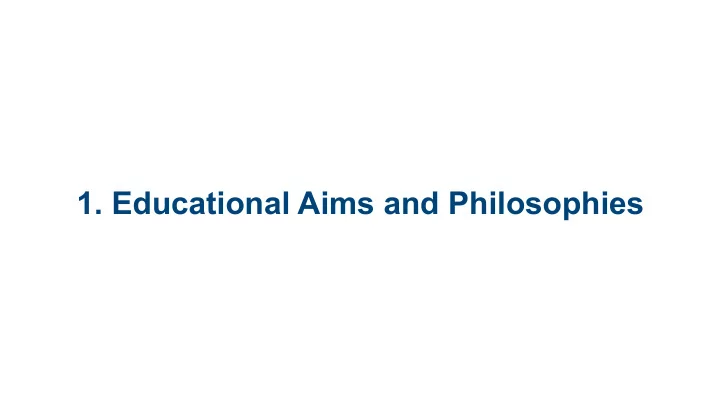

1. Educational Aims and Philosophies
Aims: Big Questions • Why does our society educate children in schools? • What are society’s aims for schooling? • In what ways do we educate children in school to accomplish those aims?
1.1 Socialization and Social Effects 1.2 Moral and Character Development 1.3 Citizenship
1.4 Career Preparation 1.5 Lifelong Learning 1.6 Summary
1.1 Socialization and Social Effects
Aim: Socialize youth 1 Give positive social experiences • School a welcoming place • School provides time and space to interact • Teachers plan and intervene to make situations positive
Aim: Socialize youth 2 Provide role models • Teachers demonstrate respect and courtesy • Teachers demonstrate logic and rationality • Teachers demonstrate enthusiasm and interest
Aim: Socialize youth 3 Provide stable social environment • School as safe place • Consistent rules and expectations
Aim: Socialize youth 4 Mini-summary: Provide positive experiences, role models, stable environment • Might be in contrast to home/community life • Critical for community or home environments of poverty and distress
1.2 Moral and Character Development
Aim: Develop positive character traits 1 Instill common values and codes of conduct • Rules and expectations that fit general society • Acknowledgement of effort and achievement
Aim: Develop positive character traits 2 Model and mold correct conduct • Exemplify and expect respect and care • Acknowledge positive words and actions • Consequences and discussions about negative words/actions
Aim: Develop positive character traits 3 Offer character education • Use real situations as they arise • Use literature, historical figures for discussion • Use drama, role-play, music, art
Aim: Develop positive character traits 4 Consider morals vs ethics • Morals: cultural or religious traditions of right vs. wrong • Ethics: justice, fairness, respect for all • Morals and ethics often same in situations, but not always
1.3 Citizenship
Aim: Develop positive citizenship traits 1 Parallels moral sense as students mature • Young children view as obedience to rules • Older children view as social reciprocity • Teens critical or idealistic on rights
Aim: Develop positive citizenship traits 2 History of citizenship • Past: Emphasis on assimilation and conformity • Present: Emphasis on rights/responsibilities
Aim: Develop positive citizenship traits 3 Civic participation • Teach/learn about issues and needs • Mock elections, debates, simulations • Posters, letters to officials or editors • Protest?
Aim: Develop positive citizenship traits 4 Multicultural acceptance • Honoring and learning about cultures • Teaching strategies with cultures in mind • Teach content with cultures in mind
Aim: Develop positive citizenship traits 5 Teach and discuss equity issues (ethics) • Gender concepts and rights • Economic disparity • Laws and social justice
1.4 Career Preparation
Aim: Prepare for adult roles 1 Communication and literacy skills • Learn to read ➔ Read to learn • Read, think, and discuss critically
Aim: Prepare for adult roles 2 • Awareness of career opportunities • Traditional, current, and future careers • Career opportunities, needs, requirements • Possibly many careers • Home and family skills?
1.5 Lifelong Learning
Aim: Prepare for a lifetime of learning and change 1 Learning how to learn (investigate, research) • Update and revise knowledge and skills • Seek information for life change
Aim: Prepare for a lifetime of learning and change 2 • Training to think critically • Analyze and evaluate new information • Incorporate new information with old
1.6 Summary
Teacher roles to accomplish aims • Socialization agent • Character trainer • Citizenship trainer • Skills and knowledge builder • Trainer for lifelong learning and change
Recommend
More recommend